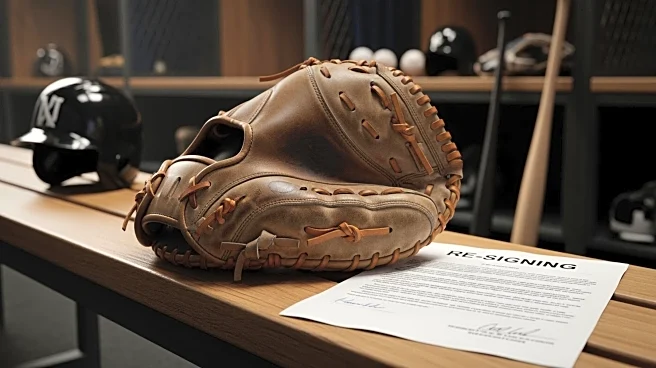What's Happening?
The Cleveland Guardians have agreed to a $4 million, one-year contract with Austin Hedges, despite his .161 batting average this season. This marks the third consecutive year Hedges has signed a similar
deal with the Guardians, emphasizing his role as a clubhouse presence and defensive asset rather than an offensive contributor. Hedges' performance at the plate has been consistently below average, with a career batting average of .185. However, his defensive skills and ability to manage pitchers have been highly valued by the team. The Guardians are coming off a season where they won the AL Central title but were eliminated in the postseason by the Detroit Tigers.
Why It's Important?
The decision to re-sign Austin Hedges highlights the Guardians' prioritization of defensive skills and team chemistry over offensive production. This move reflects a broader trend in baseball where teams value intangible qualities such as leadership and game management. Hedges' re-signing also indicates the Guardians' strategy to maintain stability in their roster, particularly in the catching position, as they continue to develop Bo Naylor as the primary catcher. The Guardians' approach may influence other teams to consider similar strategies, focusing on defensive prowess and clubhouse dynamics.
What's Next?
With Hedges back on the roster, the Guardians will likely continue their strategy of using him as a backup catcher while Bo Naylor takes on more starting duties. The team may also explore additional signings to strengthen their lineup, particularly in the outfield and pitching areas. As the offseason progresses, the Guardians will need to make decisions regarding other free agents and potential trades to enhance their competitiveness for the upcoming season.
Beyond the Headlines
The Guardians' decision to re-sign Hedges despite his offensive struggles raises questions about the evolving role of catchers in Major League Baseball. As the league considers implementing automated ball-strike systems, the emphasis on catchers' defensive skills and game-calling abilities may shift. This could lead to changes in how teams evaluate and utilize catchers, potentially affecting contract negotiations and player development strategies.









